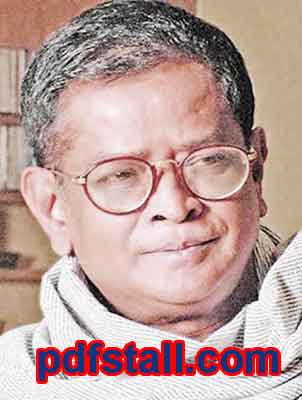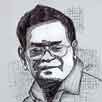
Introduction
 Humayun Ahmed was one of the most popular and renowned Bangladeshi authors, playwrights, screenwriters, and filmmakers of the 20th century. He was widely regarded as a literary giant in Bangladesh and is often credited with popularizing modern Bangla literature. Humayun Ahmed’s works have been translated into numerous languages and have been adapted into movies, television dramas, and plays. This article provides an overview of Humayun Ahmed’s life, works, and contributions to Bangla literature.
Humayun Ahmed was one of the most popular and renowned Bangladeshi authors, playwrights, screenwriters, and filmmakers of the 20th century. He was widely regarded as a literary giant in Bangladesh and is often credited with popularizing modern Bangla literature. Humayun Ahmed’s works have been translated into numerous languages and have been adapted into movies, television dramas, and plays. This article provides an overview of Humayun Ahmed’s life, works, and contributions to Bangla literature.
Early Life and Education
Humayun Ahmed was born on November 13, 1948, in Mohongonj, Netrokona, a district in present-day Bangladesh. His father, Foyzur Rahman Ahmed, was a police officer, and his mother, Ayesha Foyez, was a homemaker. Humayun Ahmed was the eldest of five siblings, and he spent most of his childhood in Sylhet, a city in northeastern Bangladesh. Humayun Ahmed was an excellent student and completed his secondary education at Sylhet Government Pilot High School. He then went on to study chemistry at the University of Dhaka, where he earned a bachelor’s degree and a master’s degree in the subject.
Literary Career
Humayun Ahmed began his literary career as a novelist in the early 1970s. His first novel, “Nondito Noroke,” was published in 1972, and it quickly became a bestseller in Bangladesh. Humayun Ahmed’s early works were characterized by their exploration of social issues and their sharp critique of societal norms and values. He was particularly interested in exploring the lives of the poor and marginalized people of Bangladesh and often portrayed them as the protagonists of his stories.
Humayun Ahmed wrote more than 200 books over the course of his career, including novels, short stories, plays, and poetry. Some of his most popular novels include “Shonkhonil Karagar,” “Kothao Keu Nei,” and “Debi.” His plays, which often dealt with political and social issues, were also hugely popular in Bangladesh. Some of his most popular plays include “Kothao Keu Nei,” “Bohubrihi,” and “Aaj Robibar.” Himu Somogro is also Famous writer.
Humayun Ahmed was also a prolific screenwriter and filmmaker. He wrote and directed several movies, including “Aguner Poroshmoni,” “Shyamol Chhaya,” and “Ghetuputra Komola,” all of which received critical acclaim. He also wrote and directed numerous television dramas, which were immensely popular among Bangladeshi audiences.
Humayun Ahmed’s Contributions to Bangla Literature
Humayun Ahmed’s contributions to Bangla literature are immense. He is often credited with popularizing modern Bangla literature and making it accessible to a wider audience. His works are characterized by their simple, accessible language, their exploration of social issues, and their portrayal of the lives of ordinary people. Humayun Ahmed’s works have been widely read and loved by people of all ages and backgrounds in Bangladesh and beyond.
His literary style was characterized by his use of colloquial language, which made his works accessible to a wider audience. He also used humor and satire to comment on societal issues and to critique social norms and values. His works often explored themes such as love, family, relationships, and the struggles of ordinary people in Bangladesh.
He was also a pioneer in the use of technology in literature. He was one of the first Bangladeshi authors to use email to communicate with his readers and to distribute his works electronically.
Humayun Ahmed’s Legacy
Humayun Ahmed’s legacy has had a profound impact on Bangla literature and popular culture in Bangladesh. He was a literary giant whose works continue to inspire and entertain readers and audiences to this day. His novels and plays are still widely read and performed in Bangladesh, and his movies and television dramas continue to be popular with audiences.
Humayun Ahmed’s impact on Bangla literature is evident in the works of many contemporary Bangladeshi authors. Many of them have been influenced by his use of colloquial language, his exploration of social issues, and his portrayal of the lives of ordinary people. Humayun Ahmed’s contributions to Bangla literature have helped to create a vibrant and diverse literary tradition in Bangladesh.
He was also a cultural icon in Bangladesh. He was beloved by his fans for his wit, his humor, and his ability to capture the essence of Bangladeshi life and culture. Humayun Ahmed’s passing in 2012 was a great loss to the Bangladeshi literary community, and his memory continues to be honored and celebrated to this day.
Conclusion
He was a literary giant whose contributions to Bangla literature have had a profound impact on the literary and cultural landscape of Bangladesh. He was a prolific writer whose works continue to inspire and entertain readers and audiences to this day. Humayun Ahmed’s legacy is evident in the works of many contemporary Bangladeshi authors, and his impact on Bangla literature and popular culture in Bangladesh is undeniable. He will always be remembered as one of the most important and influential figures in the history of Bangla literature.